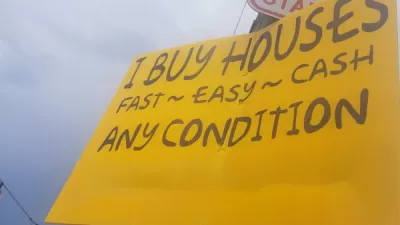An article on the Washington Post Wonkblog shows how deeply the real estate crash impacted the wealth of the Middle Class—now on the tail end of three lost decades.
"Nostalgia is just about the only thing the middle class can still afford," writes Matt O'Brien. "That's because median wealth is about 20 percent lower today, in inflation-adjusted dollars, than it was in 1984."
"It's all about stocks and houses. The middle class doesn't have much of the former, but it does have a lot of the latter. And that's bad news, because, even though the crash decimated both, real estate hasn't come back nearly as much as equities have." Moreover, "the housing bust was big enough to erase all the gains the middle class had made the past 30 years—and then some."
The problem is further exacerbated by stagnant real wages and increasing costs for things like healthcare, education, and housing.
FULL STORY: The middle class is 20 percent poorer than it was in 1984

Planetizen Federal Action Tracker
A weekly monitor of how Trump’s orders and actions are impacting planners and planning in America.

Maui's Vacation Rental Debate Turns Ugly
Verbal attacks, misinformation campaigns and fistfights plague a high-stakes debate to convert thousands of vacation rentals into long-term housing.

San Francisco Suspends Traffic Calming Amidst Record Deaths
Citing “a challenging fiscal landscape,” the city will cease the program on the heels of 42 traffic deaths, including 24 pedestrians.

Defunct Pittsburgh Power Plant to Become Residential Tower
A decommissioned steam heat plant will be redeveloped into almost 100 affordable housing units.

Trump Prompts Restructuring of Transportation Research Board in “Unprecedented Overreach”
The TRB has eliminated more than half of its committees including those focused on climate, equity, and cities.

Amtrak Rolls Out New Orleans to Alabama “Mardi Gras” Train
The new service will operate morning and evening departures between Mobile and New Orleans.
Urban Design for Planners 1: Software Tools
This six-course series explores essential urban design concepts using open source software and equips planners with the tools they need to participate fully in the urban design process.
Planning for Universal Design
Learn the tools for implementing Universal Design in planning regulations.
Heyer Gruel & Associates PA
JM Goldson LLC
Custer County Colorado
City of Camden Redevelopment Agency
City of Astoria
Transportation Research & Education Center (TREC) at Portland State University
Jefferson Parish Government
Camden Redevelopment Agency
City of Claremont




























